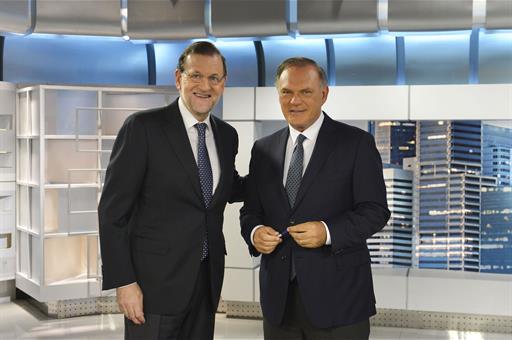Greece must "negotiate quickly because this impasse is highly negative for everyone", says Mariano Rajoy
President's News - 2015.7.6
Telecinco, Madrid
Mariano Rajoy recalled that, following Sunday's referendum in Greece, "the problems haven't gone away". Greece still lacks liquidity, still has no financing and is neither growing nor creating jobs. Therefore, the only option is "to speed things up, and clearly establish where the negotiations need to go", because "we cannot continue as we are", he said.
In his opinion, the "no" vote resulting from the Greek referendum "is not good for the Greeks, not good for Greece and not good for Europe". Despite everything, the EU remains willing to help Greece, although "Greece and its government have to follow the rules and procedures set by the EU because it will be impossible for the Euro to work otherwise".
The President of the Government recalled that Greece's debt amounts to 90% of its gross domestic product (GDP). Furthermore, Greece has already received over 200 billion euros from its European partners: a loan with a 30-year grace period and very low interest rates. He went on to add that 50% of Greece's debt with private creditors has already been partly written off and that, at present, nobody is lending money to the country. This means that "Greece is surviving on European solidarity".
Solidarity must be accompanied by responsibility
In this regard, he added that the "ball is now in Greece's court" and the country must now develop the necessary reforms for growth and job creation. "The Greek Government has to table a proposal, we have to examine it, but the key is that the Greek Government - which knows solidarity is being shown - also has to meet its obligations". "Solidarity must be accompanied by responsibility", said Mariano Rajoy.
 Carlos Serrano (Mediaset España)The President of the Government explained that the decision is not only being taken in Greece but "is rather a decision to be reached by the European Union as a whole". In his opinion, Alexis Tsipras should, first and foremost, "negotiate quickly because this impasse is highly negative for everyone" and then "meet its obligations" as Portugal and Ireland did in the past.
Carlos Serrano (Mediaset España)The President of the Government explained that the decision is not only being taken in Greece but "is rather a decision to be reached by the European Union as a whole". In his opinion, Alexis Tsipras should, first and foremost, "negotiate quickly because this impasse is highly negative for everyone" and then "meet its obligations" as Portugal and Ireland did in the past.
As regards the matter of austerity, Mariano Rajoy explained it is necessary to grow and create jobs "in order to be free and implement one's own policies". Everything can be negotiated, said the President of the Government, "but Greece must aspire to being a serious country and a free country".
Spain will remain a fundamental part of the Euro
As regards Spain, the President of the Government stressed that the situation in Greece "is going to affect us a great deal less" because of the structural reforms carried out over the last three years. He also stressed that the Euro "is here to stay" and that Spain, "in spite of what might happen in Greece, will remain a fundamental part" of the single currency.
Mariano Rajoy admitted that "we have had some tough years, but we are growing now". Specifically, we are going to post the highest growth rate in the EU - above 3% - and "600,000 jobs are also being created". Moreover, the most important thing is that "sound foundations have been created for the future, which is what will avoid situations like this from happening again".
The President of the Government also recognised that the measures adopted have incurred a social cost but that the social cost "would have been far greater" had those decisions not been taken. "I sincerely believe that I have fulfilled my duty with the decisions I took on economic issues", even though "it was not easy", he said.
In any case, Mariano Rajoy said that "unemployment is the main factor generating inequality", meaning that creating jobs and education are the two key solutions for combating it.
In his opinion, the important thing now is "for us to be able to put things right again". A good example of that is the Personal Income Tax reduction. "At present, tax revenue is improving because there is more activity, there are more people in work, consumption is up, more VAT is being paid and that is why we have been able to lower it", he said.
Elections at the end of the year
 Carlos Serrano (Mediaset España)As regards a date for the general elections, Mariano Rajoy said that "they will be held towards the end of the year". He reiterated his intention to approve the General State Budget for next year before the elections because, in his opinion, it will offer "certainty" and "a sense of normality" for the future.
Carlos Serrano (Mediaset España)As regards a date for the general elections, Mariano Rajoy said that "they will be held towards the end of the year". He reiterated his intention to approve the General State Budget for next year before the elections because, in his opinion, it will offer "certainty" and "a sense of normality" for the future.
As regards the fight against corruption, the President of the Government said that "we have to be firmer" although he recalled that a series of very important laws have been approved that will make any acts of corruption in the future very difficult.
Before concluding, the President of the Government referred to the controversy surrounding the start of the San Fermin festival, where the City Council of Pamplona decided to fly a Basque flag during the traditional ceremony at which a rocket is fired from the city hall to kick off the festivities. Mariano Rajoy recalled that "Navarre has its own flag", meaning that he understands why "many citizens of Navarre might have taken such an act for what it is; a mockery of their feelings".





